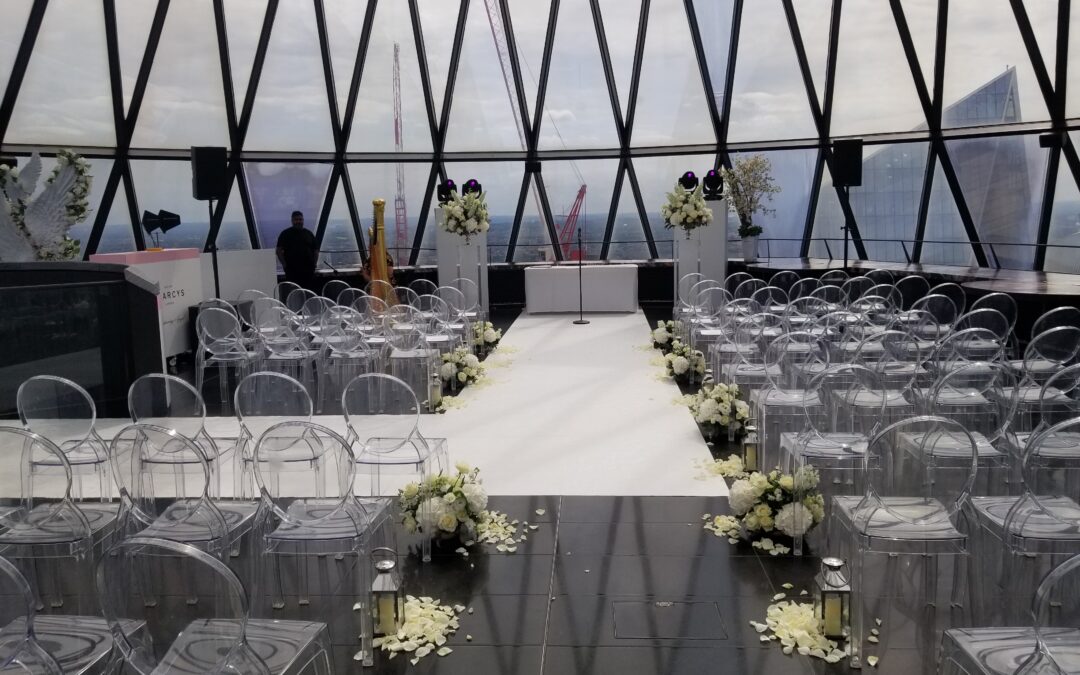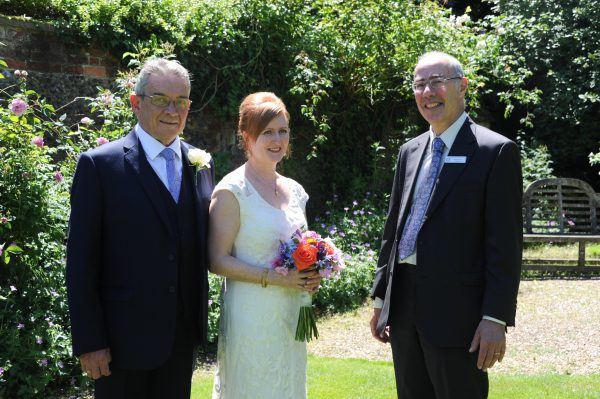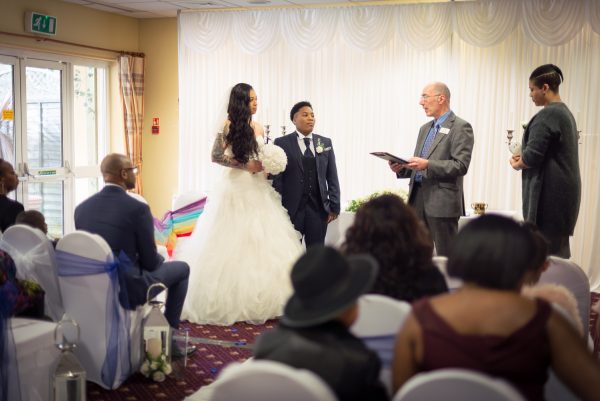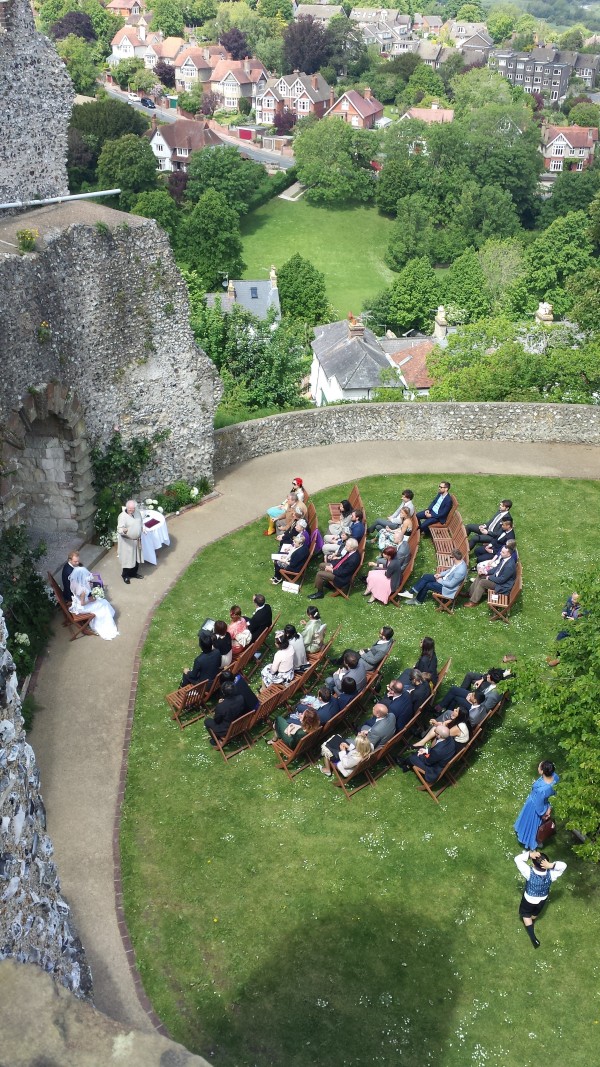
by Michael | Aug 23, 2022 | Blog
This may seem like an odd question! But you may need help deciding when to marry. By that I mean the most advantageous time, day and type of ceremony for you. (Not after downing half a dozen cocktails!)
The Ceremony
Proposals for new wedding legislation are going through parliament (slowly!) as I write. But we’re a few months away from any declaration and then the legal process won’t be that quick. So what follows is still up-to-date advice.
Register Office
Waters are slightly muddied these days, as Register Offices tend to be understaffed since COVID.
In principle, you can make an appointment, and go down there on the appointed day with two witnesses and have a 10-15 minute non-religious ceremony. That’s it.
Some registrars will come out to a licensed venue (at a significant cost) and conduct the wedding there, but this is not so easy to arrange nowadays, especially bearing in mind the staff shortages I referred to.
Alternative Ceremonies
Religious
Basically, nothing has changed regarding conventional church weddings, and that alternative is self-contained and standardised. You arrange this through your priest.
Part- or non-religious
For a unique, tailor-made service, you have a third alternative, which is where I could come in. A celebrant-led ceremony could contain as much – or as little – religion as you want, and also include rituals of your choosing. The whole service can be arranged according to your vision – even the venue. Your celebrant will be delighted to advise and guide you. Your ceremony can be as personalised as you wish.
When to Marry
As you might expect, peak periods (like July and August) tend to be more expensive. Weekends usually cost more, as do high season dates. Bank holidays and celebrations such as Valentine’s Day are likely to come out more expensive, and evenings can cost more than mornings/afternoons.
Whatever your choice, you will probably need to book well in advance, and give your guests plenty of notice. Especially if you’re opting for a destination wedding.
Discounts
It doesn’t normally hurt to ask suppliers if they’ll offer any reductions, especially if your event is out of season. They can only say no!
Conclusion
There’s plenty to think about, then, but I hope that these remarks shed some useful light, at least. You may need to be flexible and should certainly do some research, but the results can be so worthwhile.
Never forget that it is your big day, and you deserve to get it right.
Do speak to me. I’d love to help you further.

by Michael | Apr 11, 2022 | Blog
It’s understandable that I get asked what a civil celebrant actually is. I hope this blog will give you answers and paint a clearer picture, so you can see the potential benefits of working with one.
Here are a few questions I get all the time.
Are you a Humanist?
The short answer is “no”, but, in fact, I am much more than that. A Humanist is not supposed to include religious elements (or even the word “God”) in their service. However, if you want a secular service, you don’t need to resort to Humanists.
A civil celebrant can conduct a non-religious ceremony (as well as a part-religious or mixed-faith one). So that’s simple enough.
How much contact time is there between myself and officiant?
You will only meet the registrars for the first time at the marriage ceremony. The same may go for your vicar, if you’re having a church service. That’s not normally the case with a civil celebrant.
Apart from an introductory, discovery call (or visit) after your initial contact, you have access to your celebrant at all reasonable times from the time of booking until the day of the ceremony. So if you have queries or issues, it is easy to resolve them and you will feel more relaxed on the day because you will have established a close relationship with your celebrant.
How much control do I have over what goes into the service?
Only if you are working with a civil celebrant will you get free choice. Of course, you will also get guidance and advice, if wanted. Your ceremony will not be not standard or pre-ordained. You can have your own readings, vows or rituals – anything to make your ceremony personal and unique.
A church service is set in stone and the registrars offer a standard service, although sometimes they offer a modicum of choice.
So the content is basically unrestricted, if you work with a civil celebrant.
What about location and timing?
The church or Register Office ceremony is normally limited to “office hours”. A civil celebrant has no restrictions on when the ceremony can take place.
Likewise, with the location. A civil celebrant will conduct a ceremony for you almost literally anywhere. That’s clearly not the case with church weddings, and there are conditions to be complied with, in the case of Register Office services.
Hopefully, this will have clarified things a lot, but if you have further questions, please feel free to ask me!

by Michael | Nov 29, 2021 | Blog
You’re getting married? Congratulations! Have you decided who will be the officiant? Will it be a priest (or equivalent), a registrar or a civil celebrant? Did you even realise that you have a choice?!
[This post is designed for English or Welsh couples, although laws are set to change in the not-too-distant future. Separate rules apply to Scotland and Ireland.]
Religion
If you are marrying in an Anglican church, this is as simple as it gets. You will be able to combine religious and legal in one ceremony. The same applies for Jewish and Quaker weddings.
Otherwise, you will have to arrange a trip to the register office and to the (non-C of E) church before you can be declared married.
Registrars
The registrars come at the other end of the spectrum to priests, although both services are pretty much standardised. The registrars are not permitted even to mention God or religion. What they do, however, is to pronounce the legal words. Without these being uttered and witnessed, no marriage is currently valid.
You need to make an appointment with the registrars and go to their office with two witnesses. Or the registrars may come to the venue of your choice (currently, there are restrictions, such as a minimum requirement of four solid walls, although this is changing). Be aware that this will cost you substantially more.
The registrars will offer you a minimum of choice as to the service structure. And their presentation skills can vary profoundly!
Celebrants
Until the law changes, possibly in late 2022, civil celebrants cannot marry people legally. They can bless them, conduct a part-religious (or even wholly-religious) service, hand-fast them, get them to sign a marriage certificate afterwards, but none of these make the marriage legal.
So what normally happens in these cases is that the couple marries first. The venue is the register office, unless the registrars come out (which is hardly happening under current restrictions). The ceremony takes place in a private room or in front of guests.
When the registrars have left, the civil celebrant can stand up and publicly conduct the personalised ceremony the couple have been dreaming of. It may be religious, or partly so; it may be (partly) humorous; it may contain ritual; active participation may be invited; favourite readings or music may be chosen; it is going to be unique to the couple.
At the end, the celebrant may declare the couple legally married (as long as the registrar service has been completed!).
The point is that, by using a celebrant, you have free choice as to the tone and content of your ceremony on your big day.
It’s all a bit confusing, I know! But if you want any further clarification on this issue, please feel free to contact me.

by Michael | Jul 10, 2017 | Blog
Getting a few things straight
Don’t assume the ideal venue for your big event is just there for the taking. For a start, it may not be available on the day. And it might cost more than you anticipate.
So you may only be able to approximate to “ideal”. Probably before anything else, you’ll need to look at your budget.
I can’t sort your finances out for you. You may well want a castle or The Ritz, but they won’t come cheap. You may have to give up on a dream. (There may find wonderful substitutes, though, once you’ve done some research.)
So this article assumes that you accept budgetary limitations.
Ceremony and/or Reception
The other thing to get straight, from the start, is where you actually hold your wedding (or other) ceremony.
You may go from the church (say) to another venue (like a hotel) for the reception.
A lot of people prefer to keep the travel arrangements simple, or prefer a secular (or only part-religious) service. Licensed premises (licensed for weddings!) will tick both boxes. You can arrange for registrars to come and do the legal bits, and then glide seamlessly through to the next part. (That could be a civil celebrant- led personalised ceremony and/or canapes and drinks etc.)
Old Sarum is a wonderful setting for a handfasting!The third possibility is potentially most exciting. You can have the ceremony exactly where you want it (your imagination can run riot!), provided you get permission, of course. So you go (by appointment) to your local Register Office with two witnesses and get legally married. Any time after that, you go up your mountain, visit Stonehenge, mooch by your favourite canal, come into your parents’ back garden, or wherever, with your civil celebrant, and have the ceremony of your dreams.
Naturally, unless you hold this in a restaurant or hotel, you will still have to consider catering.
Choosing your Venue
Depending on your choices above, my venue suggestions would be based on personal recommendation, websites and Google to help you narrow down your search. Then, with your partner, arrange a visit, making sure you get shown round by the event planner.
Go and see a couple of possible of venues, and bear in mind that different weather conditions on the day(s) may unfairly influence your choice!
What you need to find out
Bring a list of questions with you, and write down the answers, in case you forget them later when you’re comparing notes. Naturally, you want to know the cost, but also check exactly what you get, and do not get, for the price. You may have certain requirements (eg “Can I bring in a florist from outside?” or “Can you arrange kosher catering?”) – don’t be afraid to ask.
Parking, catering, decoration, disabled access, bar, toilets, PA system, signage, choice of rooms, setting up the entertainment, buffet or silver service are all issues you are likely to need to discuss. Will the wedding planner (or deputy) be available on the day itself? How much deposit is required, and when must the balance be settled?
If the planner seems adaptable and genuinely willing to put herself out, then that looks good. Do you like her, and would you feel confident working with her?
What is also paramount is your feel for the place. Does it excite you? Do you really want to go there? If you’re lukewarm about the venue, then maybe you should look elsewhere.
If all this sounds like a lot to take in and get done, then bear in mind that you should be starting this process at least a year before the big day. Also consider that this is potentially the biggest day in your lives, and the venue can make or break it. It’s not a choice to be made lightly.
I’m always willing to help and advise, so do have a chat with me about any of the issues this article may have raised.




